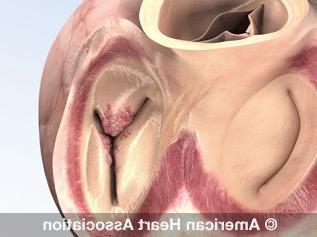Heart Valves and 感染性心内膜炎
什么是感染性心内膜炎?
感染性心内膜炎(IE), also called bacterial endocarditis, is an infection caused by bacteria that enter the bloodstream and settle in the heart lining, a heart valve or a blood vessel. IE is uncommon, but people with some heart conditions have a greater risk of developing it.
Infective endocarditis refers to infection in the lining of the heart, but it also affects the valves. It often affects the muscles of the heart.
View an illustration of endocarditis.

There are three forms of infective endocarditis:
- 急性即 — develops suddenly and may become life threatening within days.
- 亚急性或慢性IE (or subacute bacterial endocarditis) — develops slowly over a period of weeks to several months.
- 假瓣膜IE – develops within a year after heart valve replacement.
How do people contract infective endocarditis?
The infection can be caused by bacteria introduced into the blood stream. Infection can result from many sources, 包括糟糕的口腔卫生, tooth brushing that causes minor injury to the lining of the mouth or gums, 牙科手术, implanted cardiovascular medical devices, chronic skin disorders and infections, 伯恩斯, 传染病, 静脉注射毒品等等. These bacteria can lodge on heart valves and cause infection of the endocardium.
Why does endocarditis pose a threat to the heart valves?
Bacteria can grow on the valves and it is difficult to fight this infection, whether through the body’s own immune system or through medications that rely on the blood system for delivery. This results in complications such as embolization or valve destruction.
Who's at risk for infective endocarditis?
Risk factors for children and young adults include 先天性心脏缺陷 such as malformed valves or a hole in the septum, which allow blood to leak from one part of the heart to another.
Risk factors for adults include older age, 既往心脏瓣膜疾病, valve surgeries or a heart transplant, having a cardiac device in place (pacemaker or ICD), calcium deposits in the aortic valve, 先天性心脏缺陷, 心内膜炎病史, or poor care of the teeth and gums.
非法药物使用和IE
If the cause of IE is injection of illicit drugs or prolonged use of IV drugs, the tricuspid valve is most often affected. Street drugs, including narcotics, can also affect the mitral or aortic valve.
What are the symptoms of infective endocarditis?
The symptoms of acute IE usually begin with fever, 发冷, 心率快, 乏力, 盗汗, 关节和肌肉疼痛, persistent cough or swelling in the feet, 腿部或腹部.
The symptoms of chronic IE may include 乏力, 轻微的发烧, 适度较快的心率, 减肥, sweating and a low red blood cell count (anemia).
治疗
治疗 usually consists of IV antibiotics. The choice of antibiotic and the length of treatment is based on the type of infection causing the endocarditis. Surgery may be needed for mechanical complications or resistant organisms.
Prevention for those at risk usually involves awareness of the risks, appropriate dental care and heart healthy habits.
相关链接:
- Dental procedures and infective endocarditis
- Download our free IE wallet card (PDF)
- Downloadable patient sheet: What is Endocarditis? 英语(PDF) | 西班牙语(PDF)





